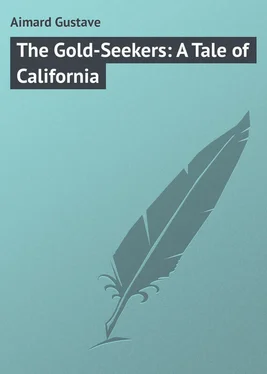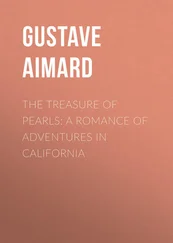Gustave Aimard - The Gold-Seekers - A Tale of California
Здесь есть возможность читать онлайн «Gustave Aimard - The Gold-Seekers - A Tale of California» — ознакомительный отрывок электронной книги совершенно бесплатно, а после прочтения отрывка купить полную версию. В некоторых случаях можно слушать аудио, скачать через торрент в формате fb2 и присутствует краткое содержание. Жанр: foreign_prose, foreign_adventure, на английском языке. Описание произведения, (предисловие) а так же отзывы посетителей доступны на портале библиотеки ЛибКат.
- Название:The Gold-Seekers: A Tale of California
- Автор:
- Жанр:
- Год:неизвестен
- ISBN:нет данных
- Рейтинг книги:5 / 5. Голосов: 1
-
Избранное:Добавить в избранное
- Отзывы:
-
Ваша оценка:
- 100
- 1
- 2
- 3
- 4
- 5
The Gold-Seekers: A Tale of California: краткое содержание, описание и аннотация
Предлагаем к чтению аннотацию, описание, краткое содержание или предисловие (зависит от того, что написал сам автор книги «The Gold-Seekers: A Tale of California»). Если вы не нашли необходимую информацию о книге — напишите в комментариях, мы постараемся отыскать её.
The Gold-Seekers: A Tale of California — читать онлайн ознакомительный отрывок
Ниже представлен текст книги, разбитый по страницам. Система сохранения места последней прочитанной страницы, позволяет с удобством читать онлайн бесплатно книгу «The Gold-Seekers: A Tale of California», без необходимости каждый раз заново искать на чём Вы остановились. Поставьте закладку, и сможете в любой момент перейти на страницу, на которой закончили чтение.
Интервал:
Закладка:
Don Sebastian, after the suspicions Don Cornelio had suggested to him, did not at all wish, as he had a young lady with him, to start before sunrise, especially as he had to traverse the gorge we have already described, and where it would be easy to form an ambuscade.
By the sunlight he had a better chance, for two reasons: in the first place, the servants who accompanied him were old soldiers, accustomed to war, and greatly attached to him; the second was, that the Mexican brigands are usually great cowards, and whenever they meet with any serious resistance from those they attack, they immediately give up the game.
These two reasons, and, before all, the fear of alarming his daughter, and uselessly exposing her to danger during the darkness, obliged the colonel to let all the other travellers at the mesón start before him; and, in fact, they soon quitted the hostelry, and dispersed in various directions.
The Señor Saccaplata, with pallid face, compressed eyebrows, and head bandaged up, was walking up and down the patio, with his arms behind his back, every now and then raising his eyes angrily to the colonel's window, and growling in a low voice, —
"Body and bones! Will not that trumpery colonel make up his mind to start soon, if he is so ready to give the bastinado to poor folk? But let him do what he will, he will not escape the fate that awaits him."
At this moment a young man appeared in the patio, strumming a guitar, and singing in a low voice, —
"No sabo donde mirar,
De todo teme y rezela,
Si al cielo teme su furia,
Porque hizo al cielo ofensa." 3 3 He knows not where to look; he fears or distrusts everything. If he is afraid of the anger of Heaven, why did he insult it?
These verses, taken from the romance of King Rodrigo, though probably sung without any malignant meaning, still referred so closely to the landlord's present position, that he turned furiously to the unlucky singer, and attacked him in a brutal voice.
"Deuce take your howling! Why do you come buzzing in this way in my ears, when you ought, on the contrary, to be preparing for your departure?"
"Why, it is our worthy huésped," Don Cornelio replied with that joyful accent peculiar to him. "What! You are not fond of music? You are wrong, my worthy friend, for what I am singing to you is really fine."
"That is possible," the other said in a rough voice; "but I should feel obliged by your giving me no more of it."
"Oh, oh! You are not in a good temper this morning. What's the matter with you, that you are so bandaged up? On my soul, you must be ill. Oh! I see what it is; you slept with your window open, and have caught a toothache."
The landlord turned green with impotent fury.
"Caballero," he shouted, "take care."
"Of what?" Don Cornelio said peacefully. "Toothache is not catching, as I am aware. Poor man! Pain causes him to wander. Take care of yourself, my good man; take care of yourself, I advise you."
And without further ceremony he turned his back on him, and began again the song which so annoyed the landlord at the point where he broke it off.
"Hum!" the latter growled, shaking his fist at the singer; "I hope that you will catch something in the row. Ah!" he added, "the sun is rising: perhaps that will induce him to come down."
In fact, the sun appeared at this moment in a bed of vapour, and after a twilight, whose duration was almost nothing, the day succeeded, as it were, immediately to night.
Don Cornelio, aided by the colonel's servants, fed the horses and saddled the mules – preparations which brought a smile to the landlord's lips which would have caused the colonel to feel uncomfortable had he seen it.
Suddenly a sound of horses was heard outside, and two men trotted into the patio, through the gateway left open after the departure of the arrieros and other travellers. At this unexpected arrival the landlord turned as if a viper had stung him.
"Confusion!" he muttered; "day has hardly broken ere these accursed fellows come across my path."
The two arrivals troubled themselves in no way about their host's ill-temper, but dismounted, and taking the bridles off their horses, led them to the noria to let them drink.
The travellers were dressed in the garb of the frontier men, and appeared to be from forty to forty-five years of age. Like all wayfarers in this blessed country, where every man must depend on himself alone, they were armed; but, in lieu of the lance or fusil usual in the interior, they had excellent Mexican rifles – a peculiarity which, in addition to their zarapés of Indian manufacture, and their fiery and half-wild mustangs, allowed them to be recognised as Sonorians, or at least men domiciled in that state.
The landlord, seeing that the newcomers did not appear to trouble themselves in the least about him, decided at length on walking toward them and addressing them.
"What do you want?" he said to them.
"Nothing just at present," the elder replied; "but so soon as our horses have finished drinking, you will give each of them a measure of maize and a truss of alfalfa."
"I am the mesonero, and not a peon. It is not my place to wait upon you," he said brutally.
The traveller who had spoken looked askance at the host.
"I don't care whether it is you or your criados who do it," he answered dryly, "provided that the order I have given is executed promptly, for I am in a hurry."
In the face of this rebuff, and especially the glance that accompanied it, the huésped judged it prudent to draw in his horns and assume a more conciliatory tone. For the last few hours poor Saccaplata had not been fortunate with his travellers. All those Heaven sent him had the air of young bulls escaped from the toril .
"Your excellencies are doubtless anxious to set out again?" he said in an insinuating voice.
The strangers made no answer.
"Not to be too curious," the landlord continued, not yet discouraged, "may I ask in what direction your honourable seigneuries intend to proceed?"
One of the travellers then raised his head, and, looking the indiscreet mesonero full in the face, said with a mocking air, —
"If you are asked, you will answer that you do not know. Come, my good fellow, have us attended to, and blow your own puchero , without troubling yourself about ours: you might find it too hot for you."
The host shrugged his shoulders and slipped away, the more nimbly because he noticed the colonel entering the patio at the moment, and felt no desire to come in contact with him.
The two strangers exchanged a smile, and, without further remark, watched the peon who was giving their horses the provender they had ordered.
Don Sebastian was ready to start: he had come to give a final glance to the horses before leading his daughter downstairs. Don Cornelio walked up to him so soon as he saw him, and after wishing him good day, drew him a little aside and whispered, —
"Look there, colonel," and he pointed to the two strangers; "those are sturdy fellows, if I am not mistaken."
"They are so," Don Sebastian made answer; "I did not notice them before."
"They have only just arrived. They would be famous recruits added to our party, if they would consent to travel with us. What do you think of it?"
"I think you are right; but will they consent?"
"Why not? If they are going the same road as ourselves they will derive the same benefit from our presence as we shall from theirs."
"That is true. Have you spoken to them?"
"No: as I told you, they arrived this moment. You ought to try to persuade them."
"I see no harm in attempting it, at least," the colonel answered.
Hereupon, leaving Don Cornelio, he advanced toward the strangers, and saluting them politely, said, —
Читать дальшеИнтервал:
Закладка:
Похожие книги на «The Gold-Seekers: A Tale of California»
Представляем Вашему вниманию похожие книги на «The Gold-Seekers: A Tale of California» списком для выбора. Мы отобрали схожую по названию и смыслу литературу в надежде предоставить читателям больше вариантов отыскать новые, интересные, ещё непрочитанные произведения.
Обсуждение, отзывы о книге «The Gold-Seekers: A Tale of California» и просто собственные мнения читателей. Оставьте ваши комментарии, напишите, что Вы думаете о произведении, его смысле или главных героях. Укажите что конкретно понравилось, а что нет, и почему Вы так считаете.












